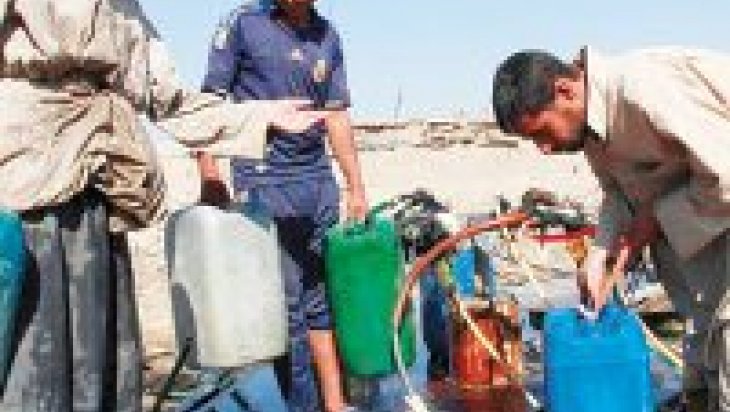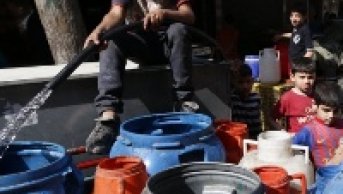Iraq Brings up Water Issue Again During FM Ahmet Davutoğlu's Visit

During Foreign Minister Ahmet Davutoğlu's visit to Iraq last week, Iraq's Shiite leader Grand Ayatollah Ali Sistani stated that Turkey is responsible for the water shortage in Iraq due to the dams Turkey built on the Euphrates and Tigris rivers and suggested that the water issue should be resolved through UN arbitration, if necessary.
There is no trilateral agreement regarding the use of the waters of the Euphrates-Tigris basin. However, Turkey has always said that basin waters would be sufficient for all three countries if the water resources were used equitably, reasonably and efficiently. To that end, in 1984 Turkey proposed a three-stage plan for the optimal utilization of the Euphrates-Tigris basin waters at the meeting of the Joint Technical Committee.
When we look at the background, we find numerous bilateral agreements regarding the riparian countries of the Euphrates and Tigris basin. Protocol No. 1, “Regulation of the Waters of the Tigris and Euphrates and of their Tributaries,” which is annexed to the “Friendship and Good Neighborly Relations Agreement” between Turkey and Iraq, was signed on March 29, 1946, and the “Economic and Technical Cooperation Agreement” was signed by the two in Baghdad on Feb. 7, 1976.
The most important protocol regarding the use of the Euphrates-Tigris basin waters is the one that was signed between Turkey and Syria on July 17, 1987. A significant result was reached in the 1987 protocol in terms of the negotiations on the water issue. The protocol was considered a temporary agreement until a final agreement was signed. The text of Article 6 of the protocol reads as follows: “During the filling period of the Atatürk dam reservoir and until the final allocation of the waters of the Euphrates among the three riparian countries, the Turkish side undertakes to release a yearly average of more than 500m3/sec at the Turkish-Syrian border and in cases where the monthly flow falls below the level of 500m3/sec, the Turkish side agrees to compensate for the difference during the following month.” The 13th Joint Technical Committee on Regional Waters meeting was held in Baghdad on April 16, 1990. According to an agreement between Syria and Iraq, Iraq shares the Euphrates' waters with Syria on a 58 percent basis. In 2009, Turkey signed bilateral protocols called the “Agreement on Water” regarding the Euphrates-Tigris and Orontes rivers with Syria and Iraq. Within the scope of the protocols, cooperation on the management of the water resources of the Euphrates and Tigris is specifically described, including terms and references related to the management of basin-based water resources, water quality and penalties for polluters.
The protocols were signed by the Ministry of Water Resources (Iraq), Ministry of Water Resources (Syria) and Ministry of Environment and Forestry (Turkey), which are responsible for technical and functional issues such as development, management and protection of water resources. Significant issues requiring transboundary water cooperation were designated in those agreements.
As for dams, the Ilısu Dam in particular has been brought forward at every meeting held with Iraq in recent years. Being the third largest dam after the Atatürk and Karakaya Dams in the Southeastern Anatolia Project (GAP), the Ilısu Dam is expected to be complete by 2014. The purpose of the dam is to produce hydroelectric power; it will not serve irrigation purposes. As we know, power production is generated via a flow of water through turbines. In other words, you have to let water flow from the dam in order to generate electricity. Furthermore, the dam is expected to store extra water during flood periods, which would protect the Mosul Dam, damaged during periods of war in northern Iraq.
In field studies carried out by ORSAM in Iraq, we had the opportunity to see the causes of the water shortage that prevails in Iraq for ourselves. Above all, as stated by the UN on World Water Day in 2011, 50 percent of the water produced in Iraq is lost due to system inefficiencies and domestic wastage. That water loss is caused by the mismanagement of water resources and damaged structures (dams, canals, water supply networks, irrigation systems, etc.). In addition, discharging waste water directly into rivers impairs water quality and thus makes water unusable. Iraq is trying to appear innocent in terms of the water shortage in the country that is caused by both the damage created by long-lasting wars and also the mismanagement of water resources by putting the blame on Turkey.




